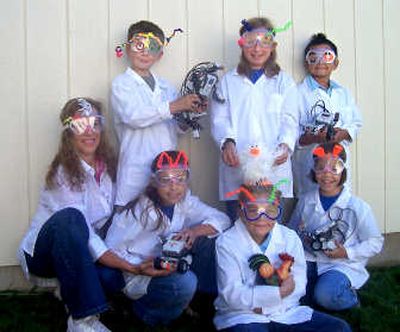Post Falls youth science team more than a bunch of chickens

In science fiction movies, they often are the enemy, but in FIRST competitive arenas, they determine a team’s fate.
They are robots, and the team of bright young technological minds that design and build them is called the Panic-Stricken Brainy Chickens. The “chickens” are a FIRST (For Inspiration and Recognition of Science and Technology) LEGO League team of three boys and five girls, all from Post Falls, who are 8 or 9 years old.
The Brainy Chickens’ sponsor, LCF Enterprises, is a high-tech business owned by Drs. Paul and Lorna Finman, who also serve as mentors for the team, which is coached by Karlicia Berry.
This is something new for Berry, a Ponderosa Elementary School facilitator for gifted and talented students. She has a master’s degree in creative arts and no relevant experience in robotics but wanted to start a children’s group.
“I find science and technology fascinating, and when I was contacted by the Finmans to coach a FIRST LEGO League team, I felt this was a great opportunity,” Berry said.
Team participants research and solve a real-world problem based on a theme that will be revealed to them next Wednesday. The team will have until Dec. 1, the day of the North Idaho championship, to prepare.
The kids will have to present their research and solutions, build an autonomous robot using engineering concepts and then use it to complete specific missions during the tournament.
If the “chickens” do well, they will proceed to the state championship.
According to Berry, the students overcome obstacles while building self-esteem and confidence. They concentrate on the five C’s – courtesy, caring, compromise, cooperation and communication.
They also are encouraged to be loud and have a lot of fun.
Supported by the National Aeronautics and Space Administration, FIRST competitions are high-tech spectator sporting events, the result of lots of brainstorming, teamwork, mentoring and project timelines and deadlines.
Meghan McLeod, 9, who joined the robotics club because she likes Berry, beamed when she showed off her first robot that she built in about 45 minutes.
“The programming is my favorite,” said Meghan. “It is challenging putting something new together.”
FIRST was founded in 1989 by Dean Kamen, who is best-known for his involvement with the Segway HT.
Kamen is an inventor, entrepreneur and advocate of science and technology. His determination to help young people discover science and technology are the cornerstones of FIRST, Berry said.
With more than 5,859 teams from 21 countries and more than 48,000 young students involved, FIRST LEGO leagues are experiencing phenomenal growth.
The Idaho Robotics Program, a collaboration between the University of Idaho space grant consortium and the Idaho state 4-H program, recently became an operational partner of FIRST. The consortium will be responsible for organizing FIRST tournaments.
According to Berry, the nation’s demand will only increase for the well-prepared, technologically literate work force needed to maintain innovation and productivity.
“As a result of these experiences,” she said, “students are inspired and excited about potential careers in engineering, electronics, computer programming and other fields.”